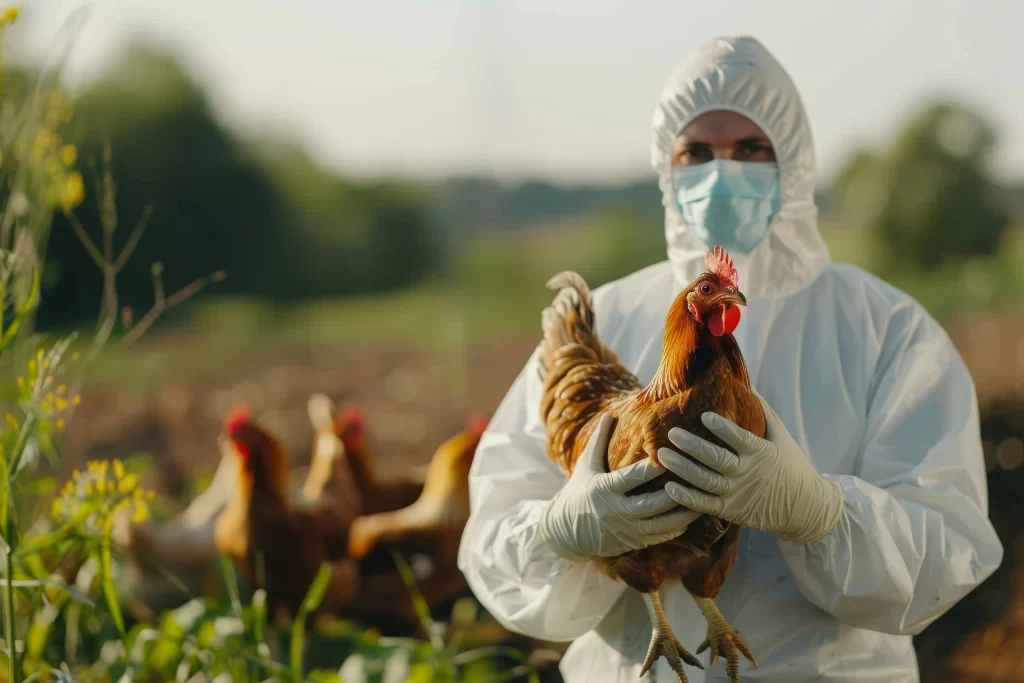As of December 2024, the USA has reported 61 cases of the Bird Flu, including one serious case in Louisiana.
Dr. Mark Mitchell, Director of Wildlife at Louisiana State University talked about virus spreading among the human population. He said “The avian influenza, if it gets into humans and starts to spread, can cause real problems.”
While these numbers might sound alarming, it’s crucial to understand that Bird Flu is manageable and preventable with the right information and precautions. Through this blog, we aim to provide a comprehensive understanding of Bird Flu, covering its nature, symptoms, and actionable steps to safeguard yourself and your loved ones. By staying informed and proactive, there is absolutely no need to panic.
What is Bird Flu and How Does it Spread?
Bird Flu, or avian influenza, is caused by influenza viruses that primarily affect birds. The H5N1 strain is concerning as it can occasionally infect humans, although human-to-human transmission remains exceedingly rare.
How Bird Flu Spreads
The virus spreads primarily through infected wild water birds like ducks, geese, and swans. These birds often carry the virus without showing symptoms, shedding it through saliva, nasal secretions, and feces.
If a poultry bird comes into contact with the infected secretion, it can rapidly spread throughout the poultry farm. The flu can also affect domestic animals like cats, dogs, and cattle. There were multiple cases of cats losing their lives after eating raw milk from infected cattle.
Exposure can occur to humans in the following ways:
- Direct contact with infected birds: Handling sick or dead birds significantly increases the risk.
- Exposure to contaminated surfaces: Touching bird droppings or environments where infected birds live can lead to exposure.
- Handling raw poultry meat: While rare, improper handling of contaminated raw meat can pose risks.
Should We Stop Consumption of Eggs and Bird Meat?
Contrary to popular belief, it is completely okay to eat eggs and bird meat as long as they are completely cooked at safe temperatures. For example, scrambled eggs are safe, but you must stay away from half-fried or sunny-side-up eggs.
Myth vs. Fact
| Myth | Fact |
| Eating chicken spreads Bird Flu | Cooked chicken and eggs are safe if properly cooked (internal temp >165°F). |
| Bird Flu spreads through air easily. | It requires close contact with infected birds or contaminated surfaces. |
| Bird Flu is always fatal. | With early treatment, recovery is common. |
Symptoms of Bird Flu in Humans
Mental health issues can affect people of all ages, though their prevalence and nature often vary. Below is a brief overview of common mental illnesses by age group:

Bird Flu symptoms in humans can range from mild to severe and may include:
- Common symptoms: fever, cough, sore throat, muscle aches, and fatigue. These symptoms often mimic seasonal flu.
- Severe cases: Difficulty breathing, pneumonia, and even multi-organ failure. Neurological symptoms like seizures or confusion have also been reported in rare cases.
- Progression of symptoms: Symptoms typically appear within 2–8 days after exposure. If untreated, they may escalate rapidly, leading to respiratory distress or secondary infections.
These statistics are not just numbers; they reflect real lives, often impacted silently. But with awareness and action, healing is always possible.
When to Seek Medical Attention
It’s essential to consult a healthcare provider if you:
- Have been in close contact with birds and develop fever or respiratory symptoms.
- Experience difficulty breathing or persistent high fever.
- Notice worsening symptoms despite taking over-the-counter flu remedies.
How to Protect Yourself from Bird Flu
Seek Professional Treatment

If exposed or symptomatic, it’s important to seek medical advice with immediate effect. Doctors may prescribe antiviral medications such as oseltamivir (Tamiflu) or zanamivir (Relenza) for Bird Flu treatment, which are effective when administered early. Hospitalization may be necessary for severe cases to manage complications like pneumonia or respiratory failure.
Boosting Immunity at Home
Balanced Diet: Start including vitamin, protein, and fiber-rich food items in your diet. Reduce consumption of sugar and processed foods that can weaken your immune system and gut health.
Also Read: Nutrition on the Go: Healthy Eating Tips for Busy Individuals
Hydration and sleep: Drink as much water as possible. Cut back on sugary sodas and even fruit juices. Sleep is also extremely important, along with a balanced diet and hydration. Getting enough sleep makes your body stronger and can reduce the risk of chronic diseases.
Exercise: Engage in moderate physical activity to keep your immune system functioning optimally. You don’t need a gym; start with basic bodyweight exercises like pushups and squats. You can also try:
These lifestyle changes are not only beneficial during virus outbreaks but can also be very helpful in maintaining overall health and well-being. Prioritizing proper hygiene practices, staying physically active, and eating a balanced diet can go a long way in preventing illness and promoting a strong immune system.
How Governments Handle Bird Flu Outbreaks
The government and health organizations play a vital role in controlling Bird Flu outbreaks. Here’s how:
Monitoring and Surveillance
Agencies like the Centers for Disease Control and Prevention (CDC) and the United States Department of Agriculture (USDA) closely monitor wild bird populations and poultry farms for signs of the virus. Early detection allows for rapid response and containment.
Containment Measures
- Quarantines: Infected farms are quarantined, and infected birds are culled to prevent further spread.
- Testing and Reporting: Poultry products undergo rigorous testing before entering the market.
- Vaccination Programs: In some cases, vaccines are administered to poultry to reduce infection rates.
Conclusion
Bird Flu news may sound intimidating, but with accurate information and preventive measures, there is no need to panic. Stay informed, practice good hygiene, and consult healthcare professionals if needed to ensure your safety and well-being. Together, we can manage and overcome such challenges with confidence.
For more blogs related to health and fitness, you can read blogs by Stayfit Stayhealthy
FAQs
- Is Bird Flu contagious between humans?
Human-to-human transmission is extremely rare and requires prolonged, close contact. - Can I get Bird Flu from eating chicken or eggs?
No, properly cooked poultry and eggs are safe to eat. Ensure an internal temperature of at least 165°F. - How effective are Bird Flu vaccines?
Experimental vaccines exist but are generally reserved for high-risk groups such as poultry workers.

